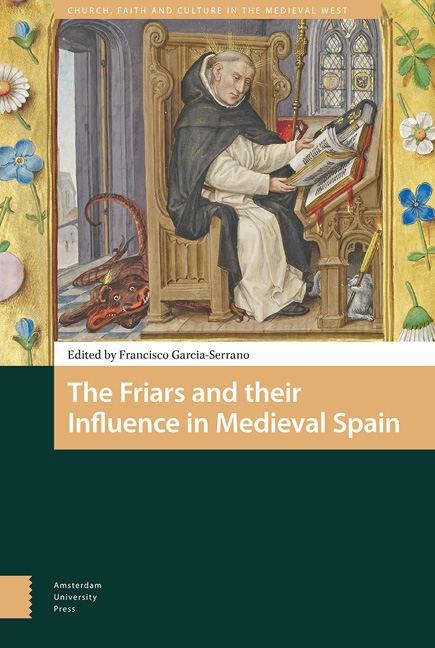Book contents
- Frontmatter
- Contents
- Abbreviations
- List of Illustrations
- Acknowledgements
- Introduction
- 1 Dominicus Hispanus
- 2 Ramon de Penyafort and His Influence
- 3 The Mendicant Orders and the Castilian Monarchy in the Reign of Ferdinand III
- 4 Ramon Marti, the Trinity, and the Limits of Dominican Mission
- 5 Narrative and Counter-Narrative: Dominican and Muslim Preaching in Medieval Iberia
- 6 The Poor Clares of Alcocer and the Castilian Crown (Thirteenth to Fifteenth Centuries)
- 7 Friars and Nuns: Dominican Economy and Religious Identity in Medieval Castile
- 8 Networks of Dissent and the Franciscans of the Crown of Aragon
- 9 Faction, Politics, and Dominican Inquisitors in the Fourteenth-Century Crown of Aragon
- 10 Sutzura e Viltat Carnal: The Place of Sin and Lust in the Treatises of the Franciscan Francesc Eiximenis (c.1400)
- 11 Valencian Dominicans Beyond the Convent of Santo Domingo
- 12 Ferdinand of Antequera and Santo Domingo el Real de Toledo: Patronage, Advice, and Spiritual Favour (c.1390–1416)
- Index
12 - Ferdinand of Antequera and Santo Domingo el Real de Toledo: Patronage, Advice, and Spiritual Favour (c.1390–1416)
Published online by Cambridge University Press: 16 February 2021
- Frontmatter
- Contents
- Abbreviations
- List of Illustrations
- Acknowledgements
- Introduction
- 1 Dominicus Hispanus
- 2 Ramon de Penyafort and His Influence
- 3 The Mendicant Orders and the Castilian Monarchy in the Reign of Ferdinand III
- 4 Ramon Marti, the Trinity, and the Limits of Dominican Mission
- 5 Narrative and Counter-Narrative: Dominican and Muslim Preaching in Medieval Iberia
- 6 The Poor Clares of Alcocer and the Castilian Crown (Thirteenth to Fifteenth Centuries)
- 7 Friars and Nuns: Dominican Economy and Religious Identity in Medieval Castile
- 8 Networks of Dissent and the Franciscans of the Crown of Aragon
- 9 Faction, Politics, and Dominican Inquisitors in the Fourteenth-Century Crown of Aragon
- 10 Sutzura e Viltat Carnal: The Place of Sin and Lust in the Treatises of the Franciscan Francesc Eiximenis (c.1400)
- 11 Valencian Dominicans Beyond the Convent of Santo Domingo
- 12 Ferdinand of Antequera and Santo Domingo el Real de Toledo: Patronage, Advice, and Spiritual Favour (c.1390–1416)
- Index
Summary
Abstract
In the turbulent years of transition at the end of the fourteenth century the monastery of Santo Domingo el Real of Toledo became one of the religious centres of greatest political activity in the late medieval Spanish kingdoms. Founded just a few years earlier under the patronage of Peter I of Castile, it was during the leadership of the prioress Teresa de Ayala (c.1400–1424) that the Toledan community reached its period of maximum institutional splendour. The extraordinary donations of this prioress of noble rank, who dealt with lay and ecclesiastical powers with considerable intelligence, and the strong relationship of her daughter, María de Castilla, with the royal family transformed their house into a centre of spiritual and political advice without precedence in the life of the Castilian court.
Keywords: Santo Domingo el Real, medieval Toledo, Dominicans, Ferdinand of Antequera
Introduction
During the period of transition between the fourteenth and fifteenth centuries, the monastery of Santo Domingo el Real de Toledo became one of the most politically influential religious centres in the Spanish kingdoms. Despite having been founded only a little time before, under the patronage of Peter I, the monastery gained what was with certainty its period of greatest institutional, political, spiritual, and economic splendour during the time when Teresa de Ayala served as prioress (c.1400–1424). The extraordinary amount of governmental funding for the priory, its noble lineage, and its interactions with those in power – paired with the extensive kinship relations of Teresa and her daughter, María de Castilla, with Spanish royalty – contributed to the conversion of Santo Domingo el Real de Toledo into an influential spiritual and political centre in the religious life of Castile.
It is during Teresa de Ayala's time that Prince Ferdinand of Castile (later known as Ferdinand of Antequera because of his brilliant conquest of that city in September of 1410) became an influential figure in the life of the monastery. He became involved with the monastery first by continuing his family's tradition of granting favours to the institution. After his accession to the throne of Aragon towards the end of June 1412, his involvement with the monastery increased as he became a recipient of the political and spiritual advice that Teresa de Ayala, and to a lesser degree her daughter María, supplied him with during the most difficult moments of his brief rule in Aragon.
- Type
- Chapter
- Information
- The Friars and their Influence in Medieval Spain , pp. 271 - 286Publisher: Amsterdam University PressPrint publication year: 2018



